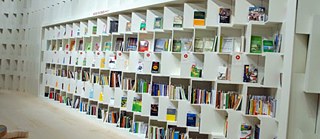Independent Publishing Houses
Diversity for the book market

They discover new talent and bring out limited series or volumes of poetry that are particularly elaborate in their design – independent publishing houses in Germany generate a welcome diversity for the book market. However just as the big publishing houses are battling with the onslaught of digitalisation, they, too, have had to face up to these challenges, says Stefan Weidle, Chairman of the Kurt Wolff Foundation.
When it comes to the way the reading public perceive independent publishing houses in Germany, they remain very much in the shadows, leading a kind of wallflower existence. Compared with the big publishers like Penguin Random House, for example, they seem to be nothing more than lifeboats adrift in a sea of bestsellers – providing a lifeline for unknown talents, for subjects that have been neglected or rediscovered and for a whole lot of other crazy stuff. Rarely do the independent publishing houses get the opportunity to show with their very presence alone just how important they are for German reading culture – the Frankfurt Book Fair being the exception.
It was there that dozens of independent publishing houses had the chance to show their wares in autumn in 2013. It was a demonstration of the diversity and strength of the smallest publishing companies, whose individual abilities and appetite for innovation are very much sought after in the wake of the sector being swamped by the wave of digitalisation. This is also the opinion of Stefan Weidle, Chairman of the Kurt Wolff Foundation – an institution that is devoted to the promotion of more diversity on the publishing and literature scene in Germany.
There are about 1,000 independent publishing houses spread throughout Germany, estimates Weidle, who runs his own publishing company and brings out between six to ten books a year. Among the 1,000 houses, however, there are quite a few which publish only on an irregular basis or have only one book in their selection. He went on to say that about 120 independent publishing houses had developed structures that could be taken seriously and that they published all kinds of content ranging from fiction to non-fiction on a regular basis.
Small print runs, big talents
Their great strength, said Weidle, was the relatively small number of copies with which the independent publishing houses make their money. “The big publishers want books that bring in at best 15,000 euros a month – the number of books that actually make that kind of money, however, is small.” At the independent publishing houses sometimes initial print runs of only 500 copies are launched. As Weidle went on to say, this is why it was possible to publish poetry or authors who are not so well known.Weidle also struck lucky himself when he published Die Manon Lescaut von Turdej – a novel by the Russian author, Wsewolod Petrow – a writer who had almost been forgotten. The book first appeared in an edition of only a thousand copies, in the meantime about 10,000 copies have been sold. A classic example of how independent publishing houses can enrich the book market. “They have people who believe in lesser known and not so successful authors and they give them a chance”, says Weidle.The biggest problem the independent publishing houses have when marketing their books is getting them on the shelves in the shops. Only rarely do the big book store chains agree to sell them. In Weidle’s opinion the diversity to be found in the small publishing houses is exactly what is missing today from the mainstream book business. “The big book shops mostly seek their salvation in popular Anglo-Saxon literature and the big bestsellers.”
That, he continues, was too narrow a view of literary reality. He also believes that customers would also welcome a greater diversity and show their appreciation. Although there have been no new start-ups recently, the number of independent publishing houses in Germany has remained at a constantly high level for quite some time now.